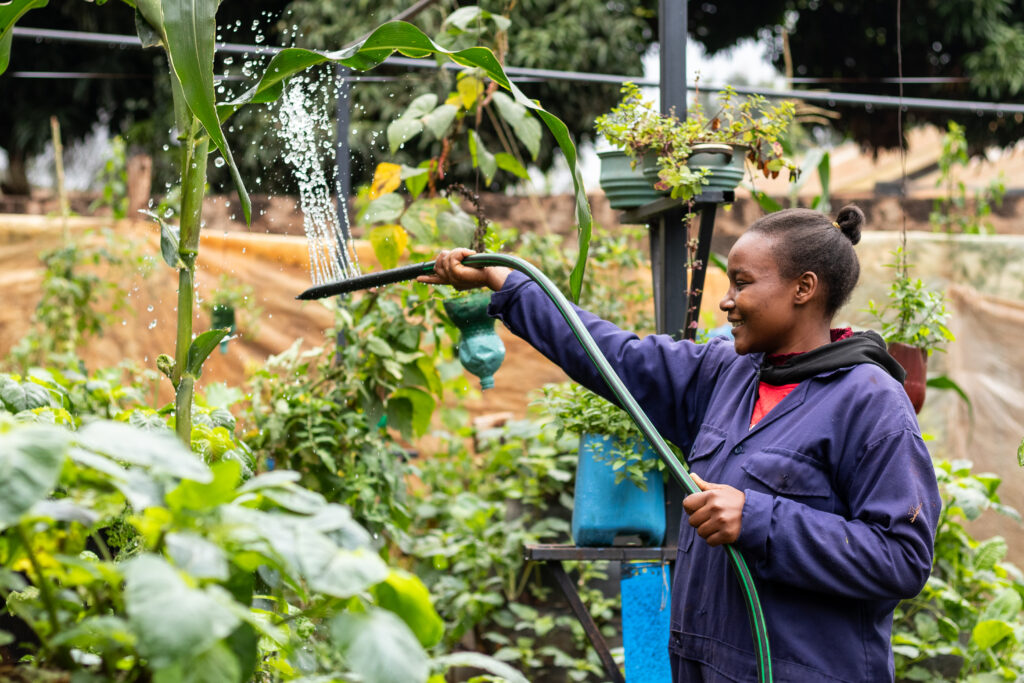Beyond food and income: how irrigation supports farmers’ health and wellbeing
As Euronews Green recently reported, failed rains and floods are doing more than destroying harvests—they’re taking a psychological toll.
For farming families, shifting weather patterns reach far beyond the soil, shaping how people feel, think, and live.
In Kaloleni, one of Kenya’s poorest regions, researchers from Aga Khan University are uncovering how prolonged droughts and floods drive anxiety and depression—especially among women.
“These communities are struggling to grow their crops and have to spend money on food,” explains Zul Merali, founder of the university’s Brain and Mind Health Institute. “This creates a lot of pressure, particularly on women, because they are in charge of making sure kids and families are fed.”
These findings echo global research linking climate stress, food insecurity, and mental health, as farmers face both lost harvests and the constant worry that rains may not come.
Yet there is hope—and it starts with water.
How irrigation restores wellbeing and resilience
While the Euronews report highlights the emotional toll of climate shocks, other research offers a hopeful counterpart: the stabilizing role of irrigation. A pilot study published in BMC Public Health, for example, found that access to small-scale irrigation significantly improved both economic and psychological wellbeing among Kenyan smallholders living with HIV.
The “Shamba Maisha” project, which equipped participants with KickStart MoneyMaker pumps, saw farmers’ annual incomes rise by an average of $1,332 and their diets diversify dramatically. Farmers said year-round irrigation gave them greater assurance and independence.
These findings confirm what KickStart has seen for over two decades: reliable water access increases harvests, fosters stability, and helps farming families live with greater security and dignity.
Everyday impacts of affordable irrigation
KickStart’s Voice of the Farmer Study surveyed more than 2,400 farmers over five years and found that those using MoneyMaker pumps now grow crops during all 12 months of the year—up from less than eight before irrigation. Nearly 92% said irrigation helps their families fight hunger.
This consistency matters. When crops thrive, families can plan ahead—putting food on the table, paying school fees, and saving for the future with renewed confidence.
Kenyan farmer Esther Auma Andal remembers the exhaustion of watering her garden by hand. “Before I used the MoneyMaker pump, it was strenuous and hard for me to even water a small garden,” she said. “With the pump, it’s much easier.”
Today, Esther grows vegetables year-round, raises dairy cows, and pays for her child’s medical care —one of many stories across KickStart’s network where irrigation has reduced stress and restored optimism.
Irrigation grows nutrition and opportunity
Beyond emotional wellbeing, irrigation nourishes the body. KickStart’s multi-country surveys show that after adopting irrigation, the share of farmers experiencing hunger dropped from 42% to just 3% within a year, and most households reported eating vegetables nearly every day.
Access to reliable water allows families to grow nutritious food at home, easing the anxiety of scarcity. It also creates new income streams that ripple outward—helping farmers reinvest in better homes, education, and health for their families.
The BMC Public Health study reinforces this link: households using irrigation reported greater food availability and dietary diversity—key predictors of better health.
The ripple effects of water security
Irrigation also strengthens communities. When water is available at the homestead, families can wash hands, clean produce, and maintain better sanitation—all of which reduce preventable disease.
KickStart’s field partners in Kenya and Zambia report that irrigation often serves a dual purpose—providing water for both crops and household use. This saves women hours once spent fetching water, freeing time for family, business, or education.
Farmers who use irrigation recover faster from droughts or floods, often becoming community anchors who share water, create jobs, and inspire others. In 2024 alone, KickStart farmers generated $11 million in new annual profits and wages, reinvesting in health care, housing, and education.
Steady water, steady confidence
For smallholder farmers, predictability is powerful. Knowing that water will be available tomorrow changes everything—from how families plan their crops to how they imagine their futures. It replaces uncertainty with purpose and worry with confidence.
As one farmer from Kakamega, Kenya, explained: “Most and greatly for us, we’ve been sustained, with our nutrition. Because when we produce, the first produce is for us before we take it even to the market.”
That resilience extends across generations. When farms are secure, children stay in school, and communities recover faster from crises. Irrigation helps families grow food and plan for tomorrow without fear.
A future of sustainable growth
The Kaloleni story ends on a sobering note: “Climate change is not going to be a short-term thing. It’s here to stay.” For millions of African farmers, adapting to that reality will require both economic opportunity and emotional resilience.
Irrigation addresses both needs. It protects harvests, supports families, and helps farmers regain control of their futures. Each KickStart pump provides stability, nourishment, and opportunity.
As KickStart’s work progresses, it builds on one enduring truth: when farmers have water, they have a way forward.
Want to help scale farmer-led irrigation?
Partner with us to expand this vital work! Contact us at kickstart@kickstart.org.
